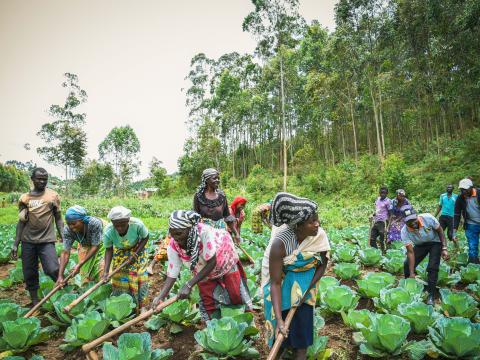Harvesting Hope: Rebuilding Lives Through Agriculture in Post Ebola Epidemic DRC

By Rodrigue Harakandi, Communications Officer
‘’After the epidemic, I learned several farming techniques thanks to World Vision. This has greatly improved my agricultural yield and enables me to feed my family properly’’, said by Kisonia, 50 years old, a member of the farmers' group supported by World Vision in Vuhovi thanks to financial support from its support office in Germany and the German government (BMZ).
The Ebola epidemic in the DRC has considerably impacted the country's population and economy, particularly in directly affected areas such as the Beni and Lubero territories in the east of the country. Restrictions on movement and the closure of borders have disrupted trade and local agricultural production.
However, this region also has important assets for the future, as it has great agricultural potential, with fertile land perfect for food production.
This is why World Vision, through its project to strengthen the resilience of populations affected by pandemics, is improving WASH infrastructure and food security by supporting 2,800 households in the VUHOVI, OICHA and MABALAKO health zones in North-Kivu province in eastern DRC.
Since 2020, around 2,800 households have benefited from seeds, cash assistance ($50 each) and training in new farming techniques.
To date, around 3,564,400kg of various crops (maize, beans, potatoes, cabbage, aubergines, carrots, amaranth, etc.) have been harvested in 49 learning fields set up in 3 health zones.
‘After attending World Vision's training courses and discovering the benefits, I suggested to my youngest son Junior that he should learn about agronomy, because for me it is a vital subject for my community. Junior didn't hesitate, and today he's in 5th secondary in agronomy and will be getting his state diploma next year," adds Kisonia.
The community supported has regained hope and is building solid foundations for a more prosperous future, resilient to future challenges through agriculture and savings groups. But in some health zones that were not supported due to limited resources, needs are still being felt and require action.
An agricultural project and economic recovery are the keys to breaking this tragic cycle. We can help cultivate the land and feed the bodies and minds of communities in need in the DRC.